OfferHubb v2.0: Mixing AdSurf Daily & Zeek Rewards

OfferHubb first popped up on my radar back in December 2012 after it was pitched by former Zeek Rewards frontman Robert Craddock.
In the aftermath of the $600M Zeek Rewards Ponzi apocalpyse Craddock requested affiliates send him money to mount a communal legal defense, and after receiving their money turned around and announced it would be used to defend Craddock and 12 of his buddies (dubbed the “Craddock 12”).
Zeek Rewards affiliates who pledged money to were asked to pay an additional sum of around $300 for a replicated legal letter, with anything resulting afterwards being up to the affiliate to handle.
Meanwhile what Craddock did with the money he received from Zeek Rewards affiliates was never made public.
Shortly after all of this occurred OfferHubb came along.
Craddock’s exact relationship with OfferHubb still isn’t clear however he does appear as a corporate spokesperson for the company in videos.
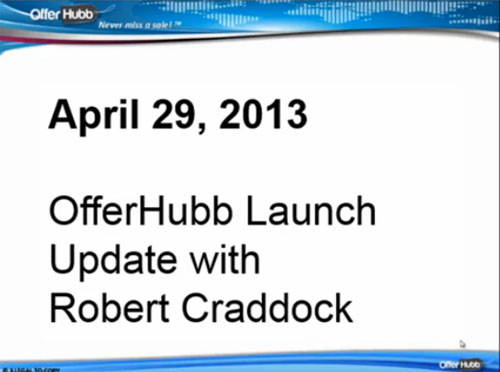
Shortly after the initial OfferHubb review appeared on BehindMLM, the company’s site was pulled along with all information pertaining to the business model and compensation plan.
Referred to as a “misstep” on a recent OfferHubb affiliate call, Craddock explains that the company runs a “live” and “beta” site, with the disappearance of a publicly viewable OfferHubb site the result of them releasing it “too quick”.
Five months later it appears the “beta” version of OfferHubb is near completion, with the company set to relaunch itself.
From what I’ve reviewed much of the compensation plan detailed in the original BehindMLM review has remained intact, with a few commission percentages having been tweaked here and there.
What hasn’t changed however is the underlying Ponzi points “revenue-sharing” scheme at the heart of the compensation plan. The same plan Zeek Rewards used with penny auctions (points) and similar to that of AdSurf Daily (advertising).
With OfferHubb combining these two models, today I thought we’d pull out of the compensation plan the key components that echo the business models of both scams before it.
Zeek Rewards saw affiliates invest in sample bids and then dump them on customers (the majority of which were fake, either created by affiliates themselves or bought from companies who created them), to earn a share of a daily ROI pool.
This pool of course was made up of other affiliate’s investment in sample bids, with the end result being affiliates buying into the scheme and being paid a daily ROI proportionate to how much money other affiliates were investing into the scheme.
The more a Zeek Rewards affiliate initially invested and then continued to re-invest, the higher their daily ROI over time.
AdSurf Daily was simpler, with affiliates investing in advertising credits and earning a daily ROI. This ROI was paid out of money invested by other affiliates.
In OfferHubb affiliates purchase advertising credits and are able to dump these on merchant accounts. When this happens an OfferHubb affiliate earns points which, you guessed it, pay out a daily ROI.
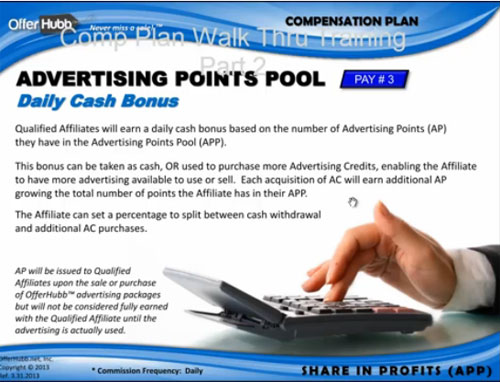
This ROI includes money spent by other affiliates on advertising credits.
In order to grow their point balances and increase their ROI over time, affiliates have to re-invest their ROI in advertising credits and continue to dump them on merchant accounts.
Affiliate Qualification
In order to qualify for the daily ROI in OfferHubb, affiliates must meet two criteria:
- recruit 20 initial “Daily Deals” customers into the scheme and 5 new customers every rolling 30 day period thereafter and
- sign up 2 merchants to OfferHubb
To meet the first criteria OfferHubb suggest affiliates sign up “friends or family”.
What do they need to do this?
Nothing more than email addresses and a few mouseclicks (taken from an OfferHubb affiliate training video):
Simply enter their email and name, select what categories they would like to receive offers from and then that’s it.
Never a penny do they need to spend with OfferHubb and they do not need to participate in any merchant offers.
With Zeek Rewards (and every other “revenue-sharing” company after it) we’ve typically seen customers for sale by third-party vendors. With nothing more than an email address needed to generate an OfferHubb customer, no doubt we’ll see history repeat itself here.
As for merchants, OfferHubb offer three options to attract them, with focus directed on the third option:
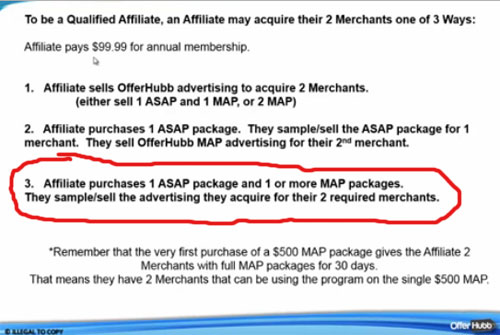
Affiliate purchases 1 ASAP package and 1 or more MAP packages. They sample/sell the advertising they acquire for their two required merchants.
Note the word “sample”, as in Zeek Rewards sample bids which were given away to customers (mostly fake) to generate ROI points.
The same idea is present here. OfferHubb affiliates buy advertising packages themselves and dump these on merchant accounts. In this manner merchants don’t have to spend money. Only two are required to qualify an affiliate and they can continue to dump advertising credits onto them as long as they remained signed up.
The presenter of the video the above screenshot was taken from personally recommended affiliates opt for the third self-funded option.
On both qualification criteria, affiliates are able to self-qualify themselves with no products being bought by or sold to retail customers.
The only monetary transfer that occurs is affiliates paying into OfferHubb.
The Revenue-Sharing Pool
Once qualified as above, affiliates then shift their focus onto growing advertising points balances in order to increase their share of the daily ROI paid out.
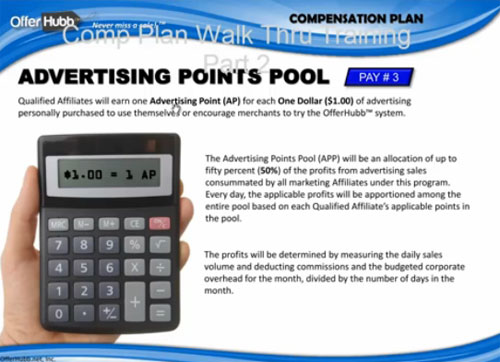
The daily ROI pool in OfferHubb is referred to as the “Advertising Points Pool”, and pays affiliates based on how many points they have.
How do affiliates get points?
They buy advertising credits themselves and dump the advertising on merchant accounts.
All or a portion of the daily ROI paid out is then re-invested back into advertising credits, which in turn generates more points.
This mechanic is straight out of Zeek Rewards and is what I refer to as the “Ponzi points” business model. Affiliates pump real money into the scheme, are awarded points (a virtual currency), which then pays out a daily ROI from other affiliates’ newly invested money.
Matrix Commissions
A straight recruitment-based commission, like Zeek Rewards OfferHubb pays its affiliates autoship recruitment commissions on three tiers, Associate ($20), Director ($50) and Executive ($100).
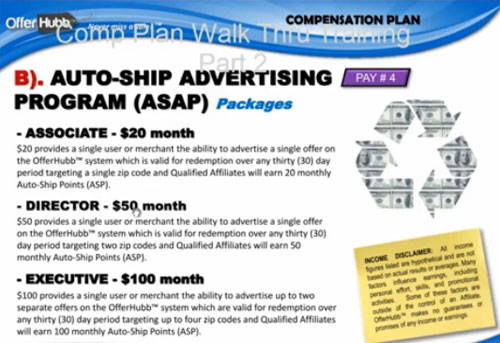
The more affiliates pay each month the more points they generate and earn via the matrix.
OfferHubb do point out that participation in this side of the compensation plan is optional, however if an affiliate does want to earn recruitment commissions, they have to qualify by signing up for autoship.
The matrix used to pay out commissions is initially a 2×5 matrix (2 levels branching out into two levels and again down 5 levels total), with it being expandable down to 20 levels, based on how many new affiliates have been recruited and their own recruited affiliates.
Conclusion
Attached to the above affiliate-funded daily ROI business model is a Daily Deal site, in which genuine merchants are supposed to put up daily deals for the customers affiliates are signing up.
In Zeek Rewards we had a similar front, with sample bids supposedly being given away to attract legitimate customers to the Zeekler penny auctions, who would then spend non-affiliate on bids.
The SEC revealed that 98% of the bids purchased in Zeek Rewards were by affiliates.
Is OfferHubb going to be any different?
From a merchant’s perspective they can pay up to $500 a month to advertising on OfferHubb’s Daily Deal’s portal.
The success of the portal lies in visitors, customers to be precise. How are these customers being generated?
Affiliates (and presumably third-party merchants selling customers) are punching email addresses into a form.
On top of this, you’ve also got a host of affiliates who need to sign up merchants to qualify for their daily ROI, and by investing in the scheme themselves are going to want to dump credits on merchants.
As a merchant it’s not going to hurt to sign up to something and receive free advertising to, let’s face it, mostly affiliates participating in the income opportunity, but pay their own money for it?
Yeah, that was a myth in Zeek Rewards and with a near-identical business model it’s not going to be any different here.
“But Oz, advertising it totally different to penny auctions!”
Read up on AdSurf Daily and the multitude of advertising based Ponzi schemes that have popped up after it. Advertising has been the defacto “go-to” front for online Ponzi schemes over the past half-decade or so.
And the autoship matrix commissions? This was also in Zeek Rewards and identified by the SEC for what it was, a pyramid scheme. Sign up affiliates, whack them on monthly autoship and the more you pay for autoship the more you earn.
Peel back the layers of OfferHubb and all you’ve got is Zeek Rewards “Ponzi points” reloaded with a Daily Deals portal and advertising.
And just like Zeek Rewards, there seems to be the misconception that how affiliates advertise the scheme determines the mechanics of OfferHubb’s business model, rather than the actual business model itself.

At the end of the day Zeek Rewards wasn’t busted because people were running around advertising it as a Ponzi scheme. It was busted because it was a Ponzi scheme.
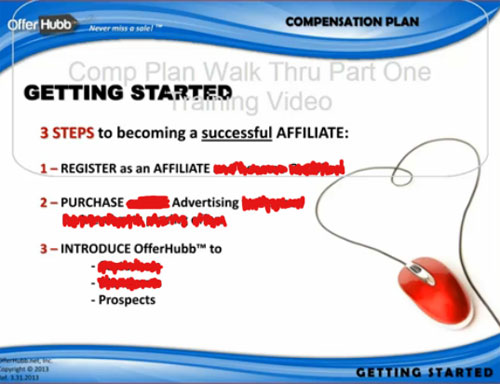
Advertising credits, dumping samples to generate points, an affiliate-funded daily ROI, shares in the ROI determined by points… here we go again.


For historical purposes, this is the disclaimer on Ad Surf Daily’s website before it was shut down as a Ponzi scheme…
You can draw your own conclusions. 🙂
(taken from court forfeiture document against Andy Bowdoin and ASD http://www.tallahassee.com/assets/pdf/CD11468785.PDF )
If people are stupid enough to invest in this, then they deserve to lose what they invest.
Now, now, NHRA… Not all people know what ASD and Ponzi schemes are…
Though I *do* wonder about those serial “opportunity seekers”… do they simply go around like Ahab “looking for *the* one” and not care about the costs, or are they just deliberately being dense for/to themselves?
Why should they worry? Or feel any guilt?
AFTER ALL as long as they keep their winnings at about $20,000, they can wait until the scheme dies out itself, or even do things themselves to bring it to an end…then poof, they can be gone and it is on to the next $20,000 win. Rinse, repeat.
The reason being because $20,000 is not worth the cost of trying to clawback, or whatever other consequence ..
That’s *if* they win at all. There are plenty of serial opportunity seekers who come out on the LOSING end repeatedly.
I have never said that. I said “If you haven’t received any claim yet, there’s good chances you won’t receive any claims either”. But the Receiver sent out 16,000 “invitations” 2 weeks later.
I have never mentioned $20,000 or any other amount as “safe”. That sounds more like your own “wishful thinking” than anything from the discussion.
That was from the discussion with “Bouncin Betty”. It was about a specific situation where the money already had been used.
It was about if you can’t repay the money voluntarily in normal ways, and you don’t receive any claims either, feeling “guilty” about the situation won’t solve anything. And I offered the idea about “accepting the morality of the Court”. The idea needs to be combined with other ideas to work.
I’m a salesman, and I will normally try to offer solutions to something, “by nature” and “by instincts”. But that solution was designed for one specific situation. If the situation has changed, I will probably offer other solutions.
Sorry, I was a big fat loser.
But you can’t deny that there is most likely one or two out there that does fit the scenario. In fact, it occurred to me awhile back that they could possibly be sabotaging the schemes themselves so they can make off with the winnings. Hide themselves in far away places.
$20,000 was the amount that Bouncing Betty gave as his/her winnings and you told her that it was on the low end and she/he was probably safe. Now, you probably didn’t use those exact words, but that is the essence of what I took to be the meaning of what you said. Peace.
I for one can say that I am just sick and tired of these crazy companies. I have to say Offerhubb sounded great in the beginning.
Here is something that I am unclear on – is it illegal to have profit sharing in a company – we keep hearing people scream, daily profit sharing plans are ponzi schemes.
Why are daily profit sharing plans illegal. From what I gather it’s because the affiliates are front loading them with their own money???
Here is the better way to ask the question – What does make daily profit sharing companies Legal???
I would just like some clarification on this.
First off there are many legitimate profit sharing companies, just look for stock shares that pay dividends. But each and every one of them is registered with the SEC or the similarly situated agency in other nations.
And not a single one of them offers anywhere near 1% per day ROI. And for damn good reason, such payouts are simply impossible for sustainable and legal companies to maintain.
For the most part that is all there really is to say but for sake of specificity let’s get clearer.
If a company is using your money to make money, sharing some of the profit with you while they are doing the real work, they are offering an investment and investments need to be registered. If they aren’t and make their offer public they are breaking the law.
Why doesn’t a company like Zeek Rewards just go ahead and register as a security and therefore become legal?
Because their business model and practices would become scrutinized by the same people who eventually shut them down and they would never have been allowed to open in the first place.
Why? Because ponzi schemes are illegal and no company offering anywhere near a 1% ROI compounding per day is anything but a ponzi scheme.
@SicknTired
Revenue sharing, profit sharing, daily revenue bonus or whatever you want to call it; If affiliates can fund their share in a daily ROI, which consists of other affiliate’s deposited money into a company then it’s just an MLM rework of a Ponzi scheme.
Attaching products to it doesn’t make an iota of difference to the mechanics of the business model:
Affiliates put money in and earn a daily % correlating to how much they initially put in and continue to reinvest, with the daily ROI primarily paid out of other affiliate’s invested money.
The 2-up is making a return too under the guise of “100% commissions” (which when combined with a 2-up/3-up style plan is just cash gifting). I suspect we’ll see some high-profile company busts this year or next to reaffirm the illegality of these plans.
Then of course they’ll pop up again in a few years time and we can go through it all over again with a new generation of MLM gurus who’ve “cracked the code” with their “never seen before” compensation plans.
They are supposed to sound interesting… Otherwise people won’t sign up. Even if it’s NOT interesting, they have to MAKE IT sound interesting.
Revenue sharing is not illegal if it’s actually revenue generated from CUSTOMERS.
The problem is most of these bogus companies share revenues generated from AFFILIATES, making it a Ponzi scheme.
The difference is simple:
–a customer buys product/service,
–an affiliate gets PAID (when someone buys product/service as commission)
Both Zeek and OfferHubb mix the two together by using the “promotion” excuse. The affiliate gets PAID when he puts his OWN MONEY in “buy stuff for the target as free promo”.
Or to put it plainly, affiliate is PAYING HIMSELF, and if he made a profit, that profit must have came from other affiliates, thus, Ponzi scheme.
Thank you for that clarification. It does make total sense.
So here is my next question – well actually I would rather ask this one off the record – My email was submitted – and thank you for not publishing it – could you please email me a way to connect with Oz,and K. Chang – I have another question I would like to ask away from the forum.
I don’t see your address as Oz is the admin here.
@SicknTired
Contact button is on the top right of every page.
@ k chang – is there an email or website for you that I can contact you?
If you click on my name it goes to my blog, but here’s the URL: amlmskeptic.blogspot.com
Almost forgot, here’s the disclaimer on Zeek Rewards before it was shut down:
Read the same as the OfferHubb version, doesn’t it?
You know what baffles the heck out of me….WHO are the owners? The only idiot you ever hear from is this whacko Robert Craddock who is such a liar its incredible.
This guy talks out of both sides of his mouth, he is one smooth con man. I hope people are smart and get out of this thing before you lose all your money.
If you have to “invest” your own money to get someone to use your product – makes me wonder if there is any value in the product at all.
This thing has PONZI SCHEME written all over it. I have been to Ripoffreport.com and one of the owners David Flynn is all over that blog site.
Lord help them all
Still Appalled